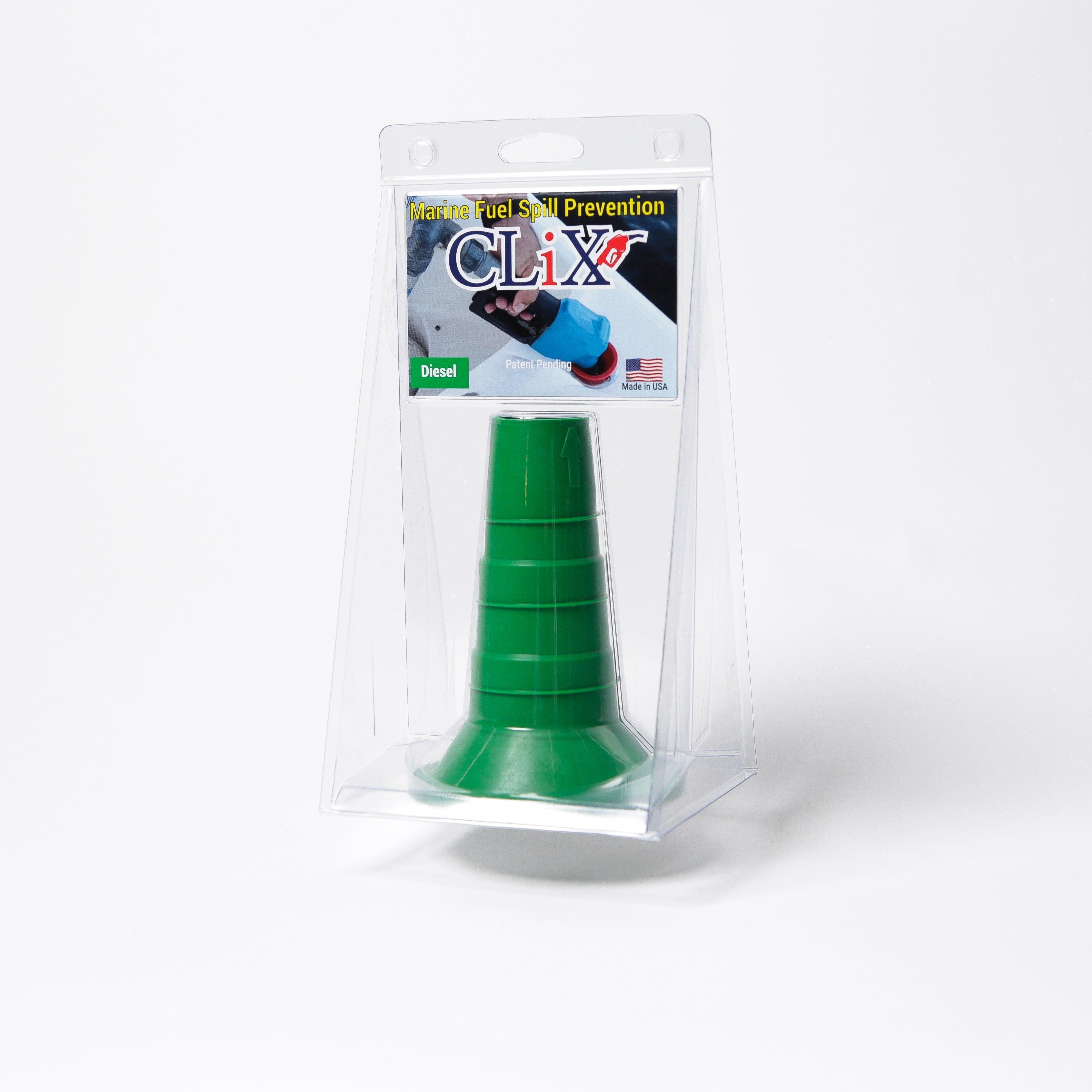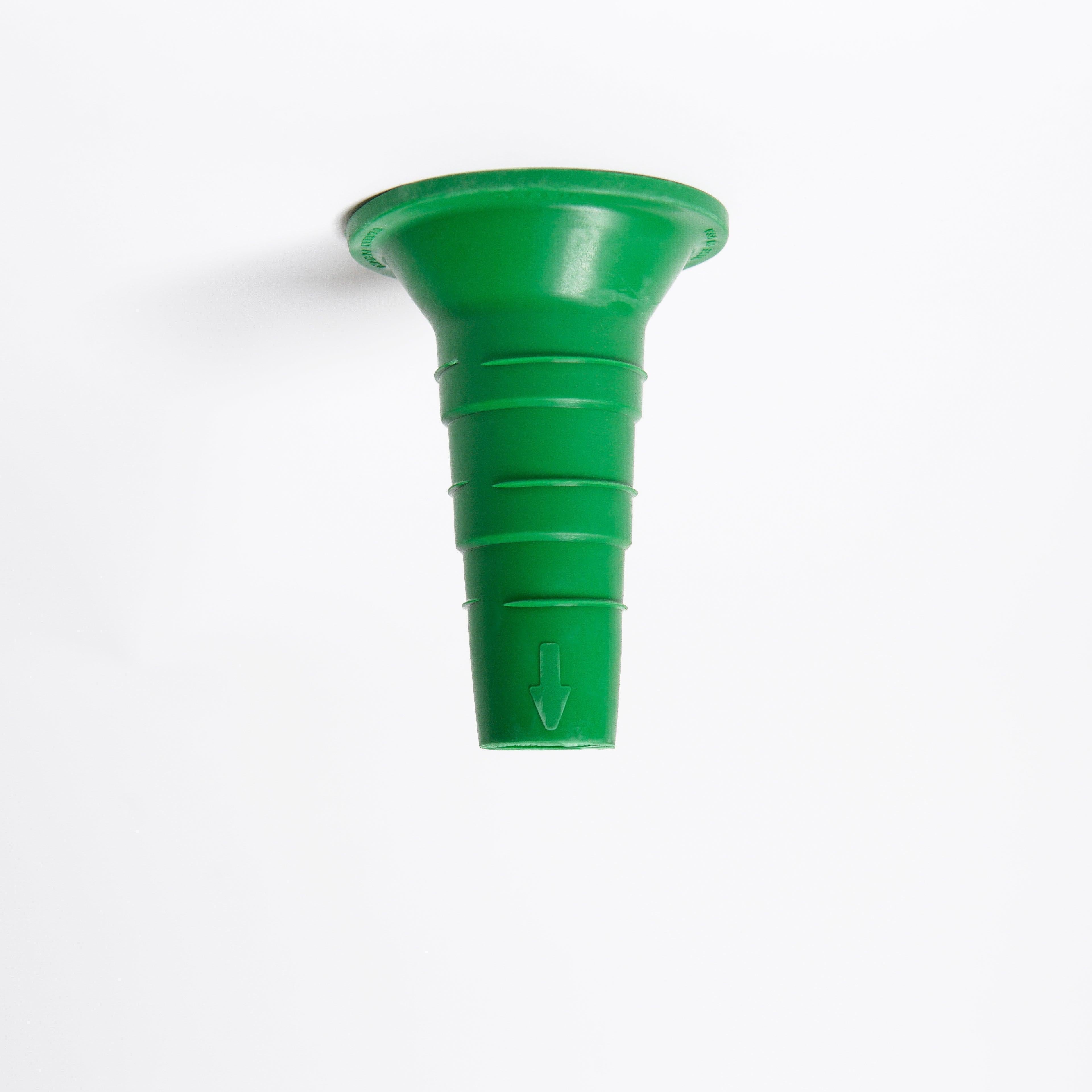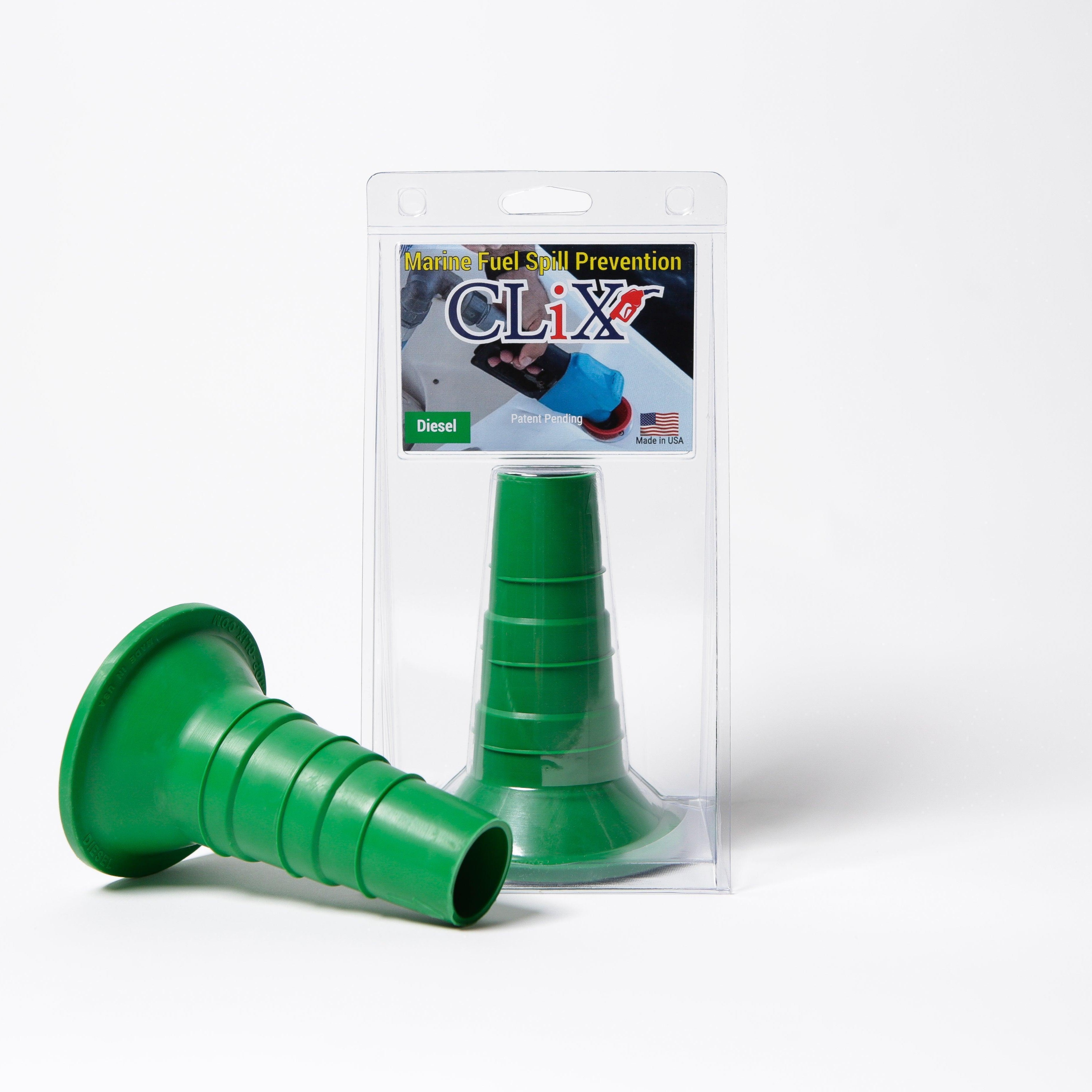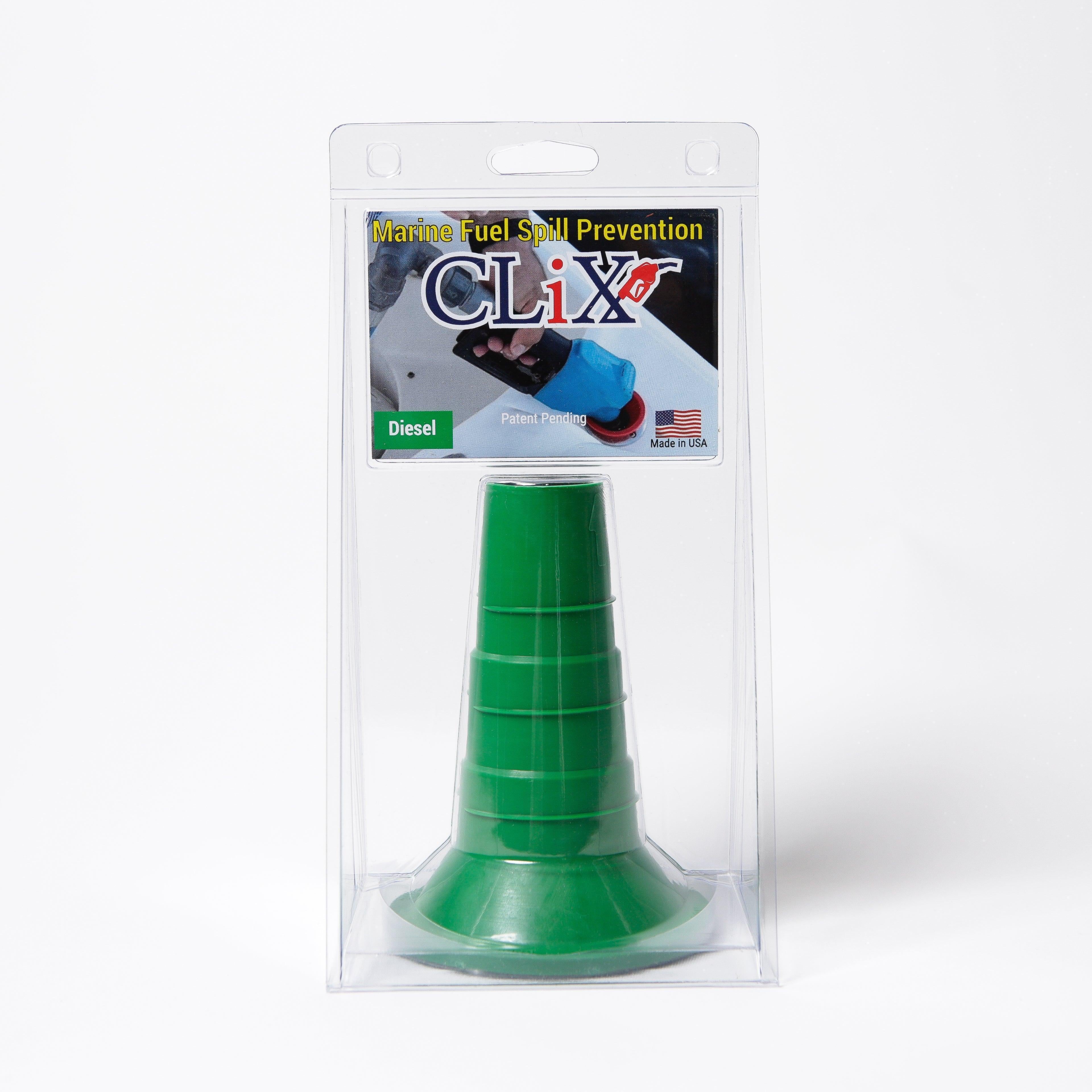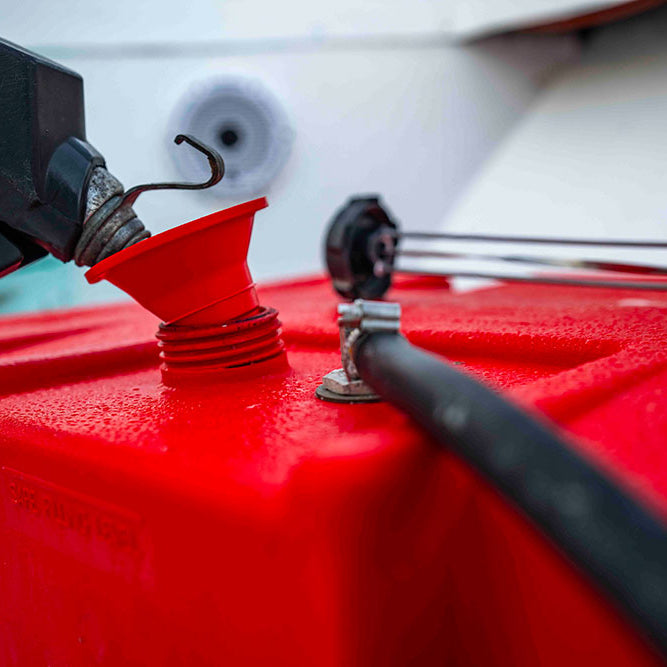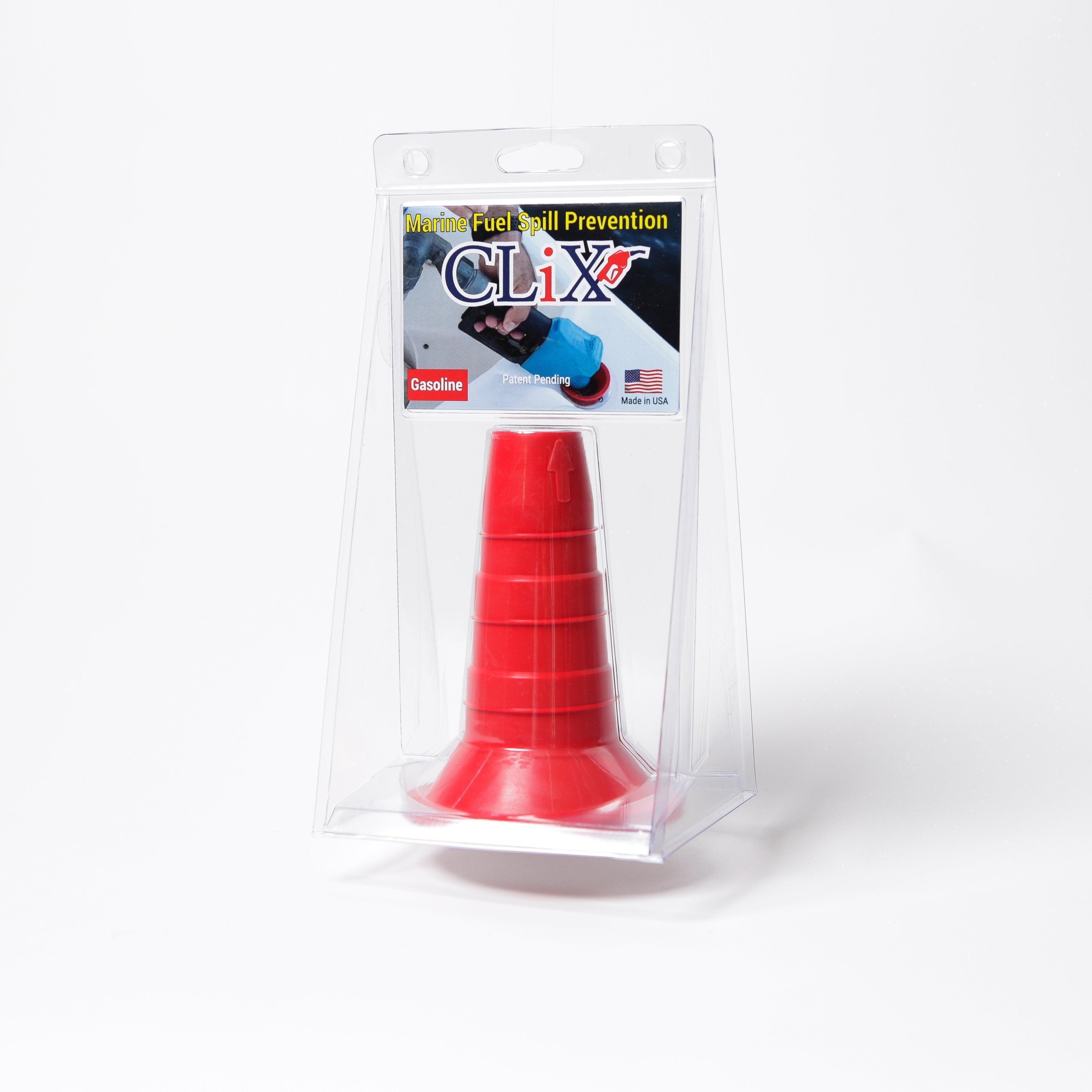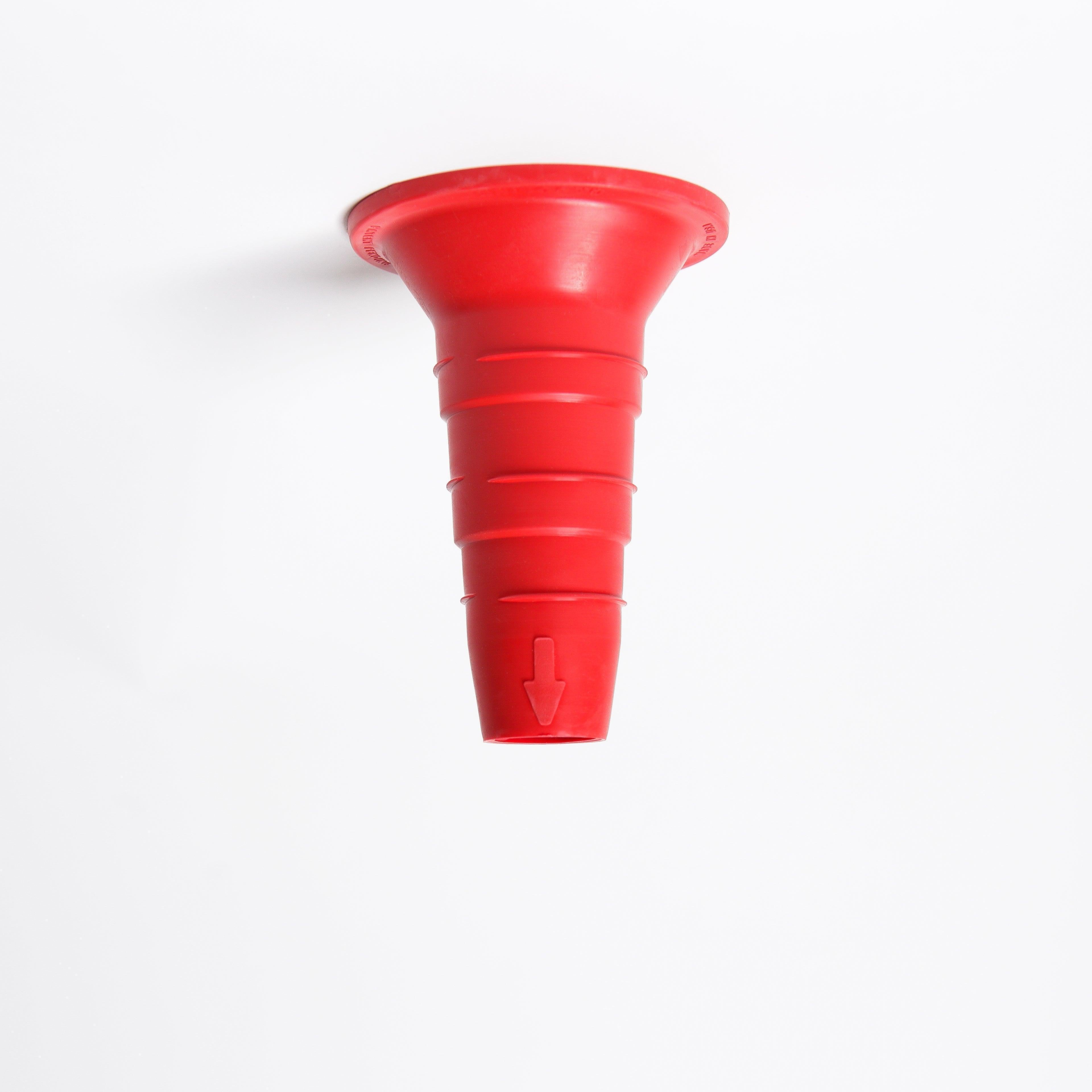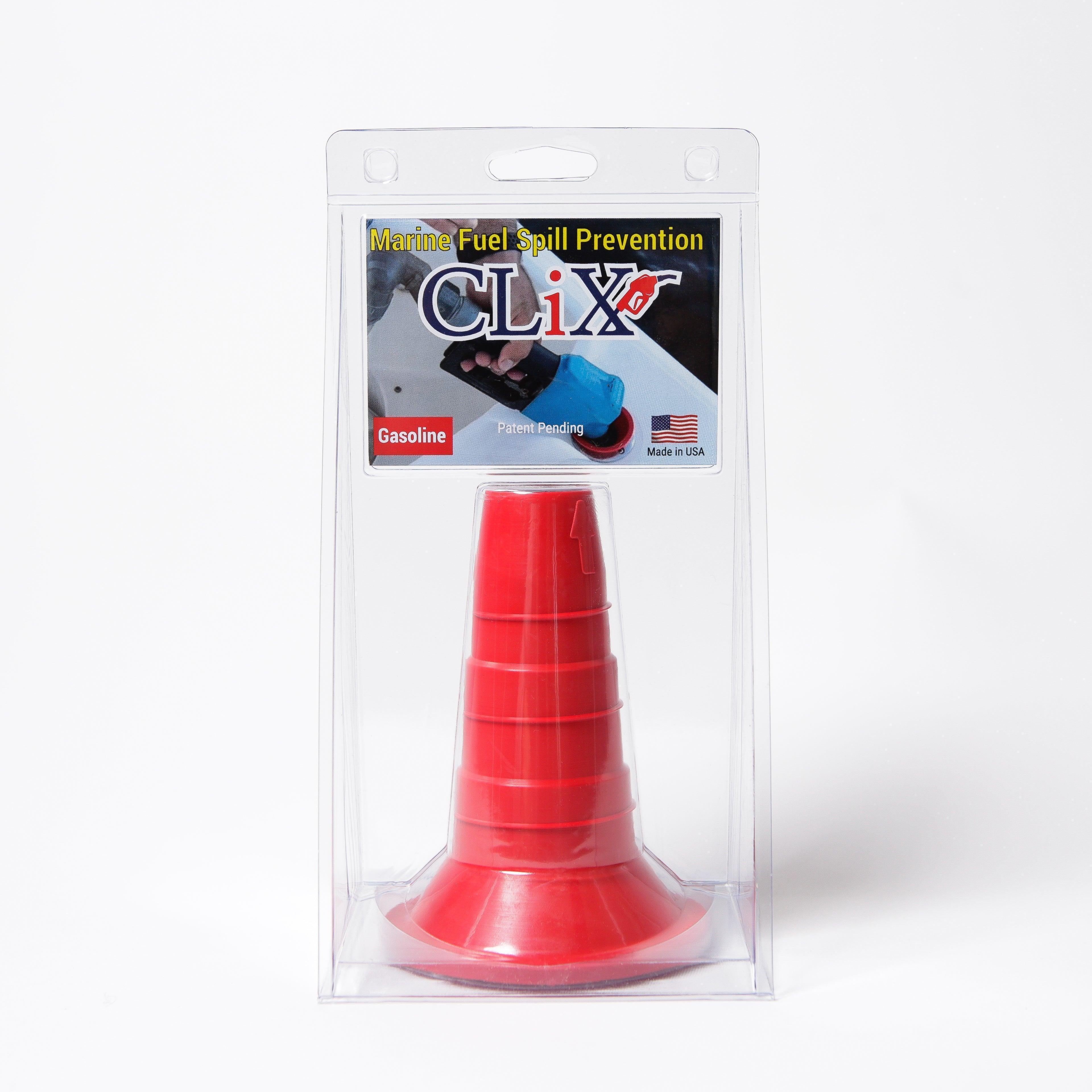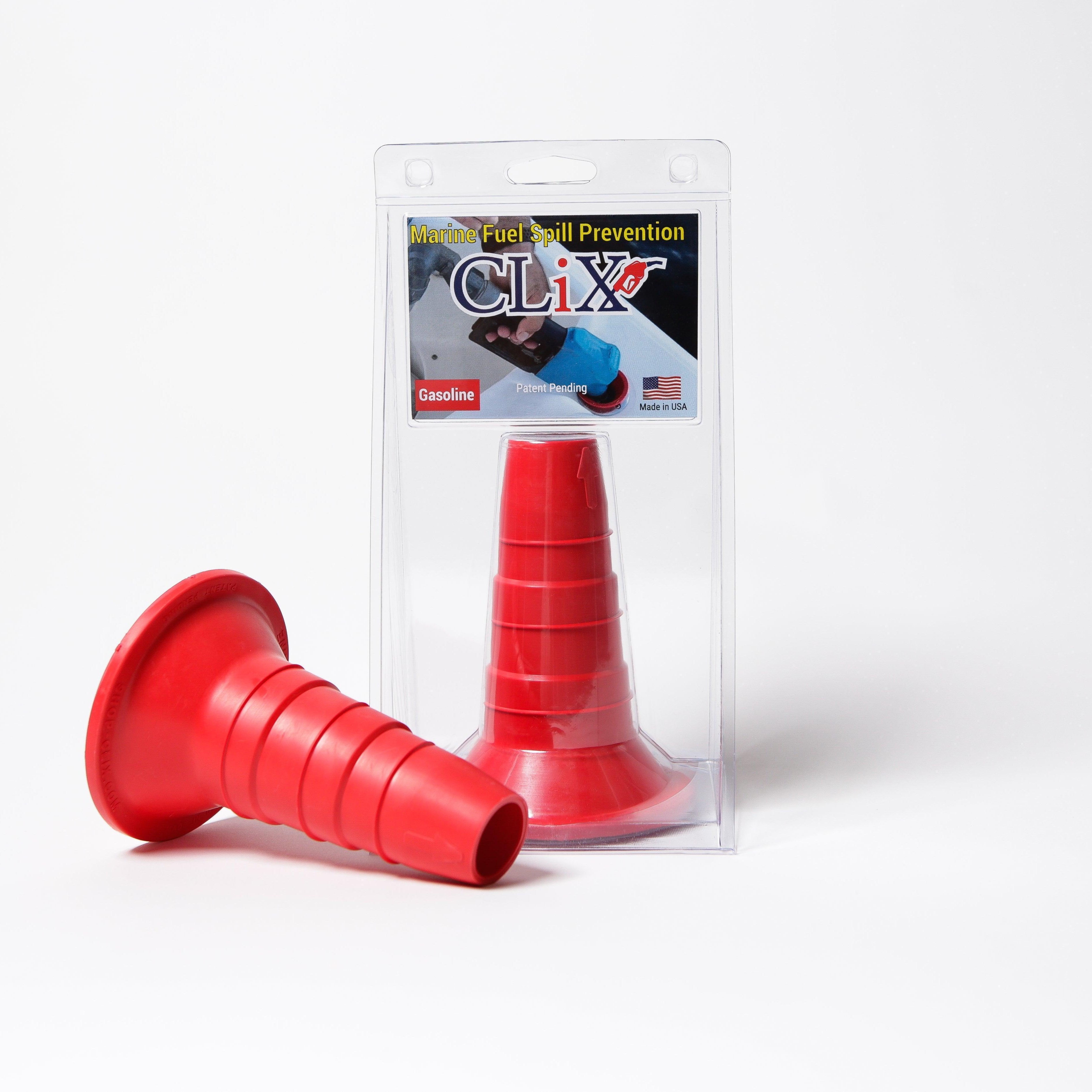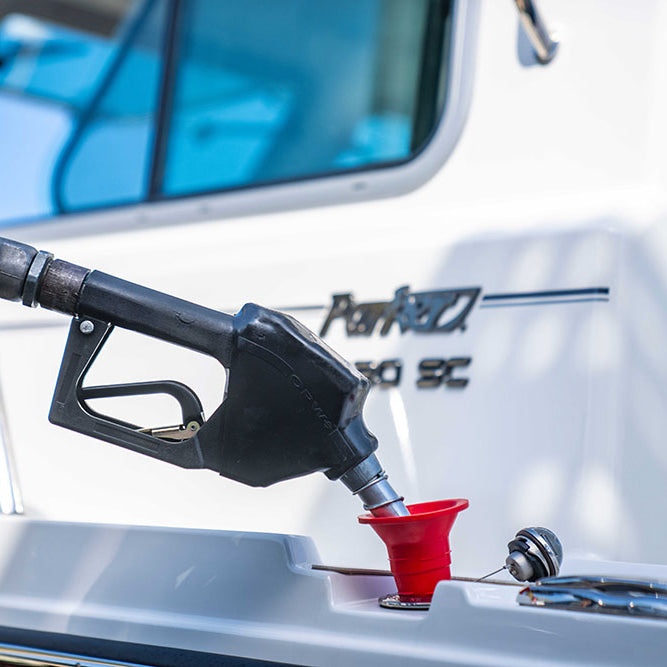Why Your Engine Deserves a Fuel Filter Funnel
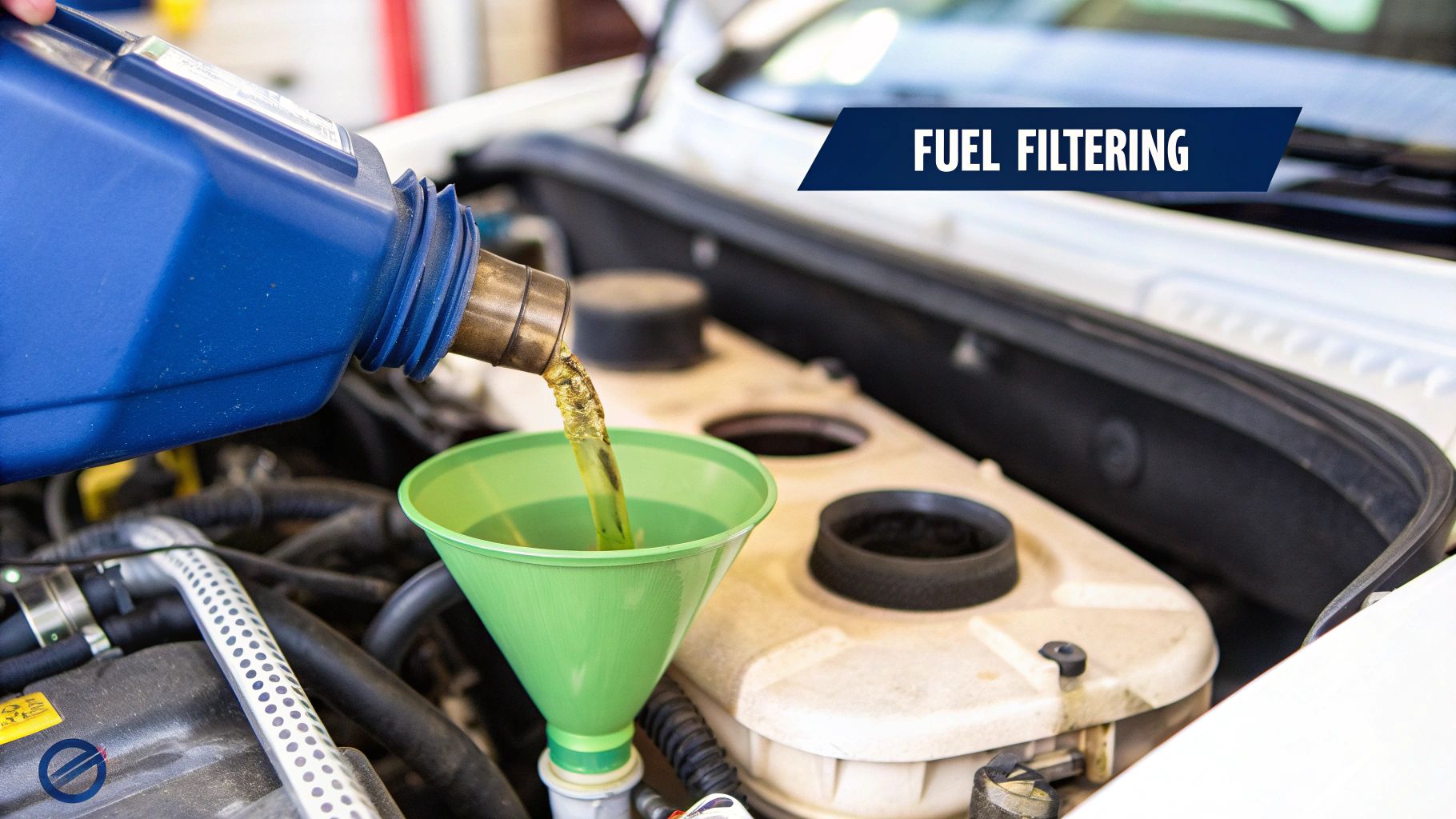
Your engine is a complex machine that needs clean fuel to run smoothly and last a long time. Think of it like your body needing clean water. Contaminated fuel can harm your engine, just like dirty water can harm your body. That's why a fuel filter funnel is so important. It's the first line of defense against harmful particles and water that can damage your engine.
How Fuel Filter Funnels Work
Fuel filter funnels are different from regular funnels. They don't just pour fuel into your tank, they clean it too. They use fine mesh screens, and sometimes magnets or water separators, to trap even tiny bits of debris. This keeps rust, dirt, and other impurities out of your fuel lines, fuel pump, and engine.
Many fuel filter funnels are also great at separating water from fuel. This prevents corrosion and other water-related problems in your fuel system. This is especially helpful when using portable fuel containers, where condensation and debris can build up. One common issue these funnels help prevent is contamination. If your car jerks when accelerating, you might have a fuel problem. Check out this resource for more information: car jerks when accelerating.
The Importance of Clean Fuel
Even small contaminants can cause big problems. Tiny particles can clog your fuel injectors, which affects how well your engine burns fuel. This can lead to less power, worse fuel economy, and more emissions. Water in your fuel can corrode fuel lines and tanks, causing leaks and costly repairs.
Larger debris can damage the fuel pump, potentially leading to complete failure. The importance of clean fuel is reflected in the growth of the fuel filter market. The global car fuel filter market was estimated at $1.74 billion in 2024. It's projected to reach $3.05 billion by 2034, growing at a CAGR of 5.8%. This shows the growing importance of fuel filters, especially for newer cars. You can find more statistics here: Learn more about fuel filter market growth.
Investing in Engine Protection
Your car probably already has a fuel filter. But a fuel filter funnel adds extra protection, especially if you're unsure about the fuel quality. This extra step can save you money on repairs in the long run.
By keeping contaminants out of your fuel system, you're protecting your engine and ensuring it runs well for years to come. This means fewer trips to the mechanic, lower maintenance costs, and a smoother, more reliable driving experience. A fuel filter funnel is a small investment that offers big returns for your engine's health and your peace of mind.
Choosing the Perfect Fuel Filter Funnel For Your Needs
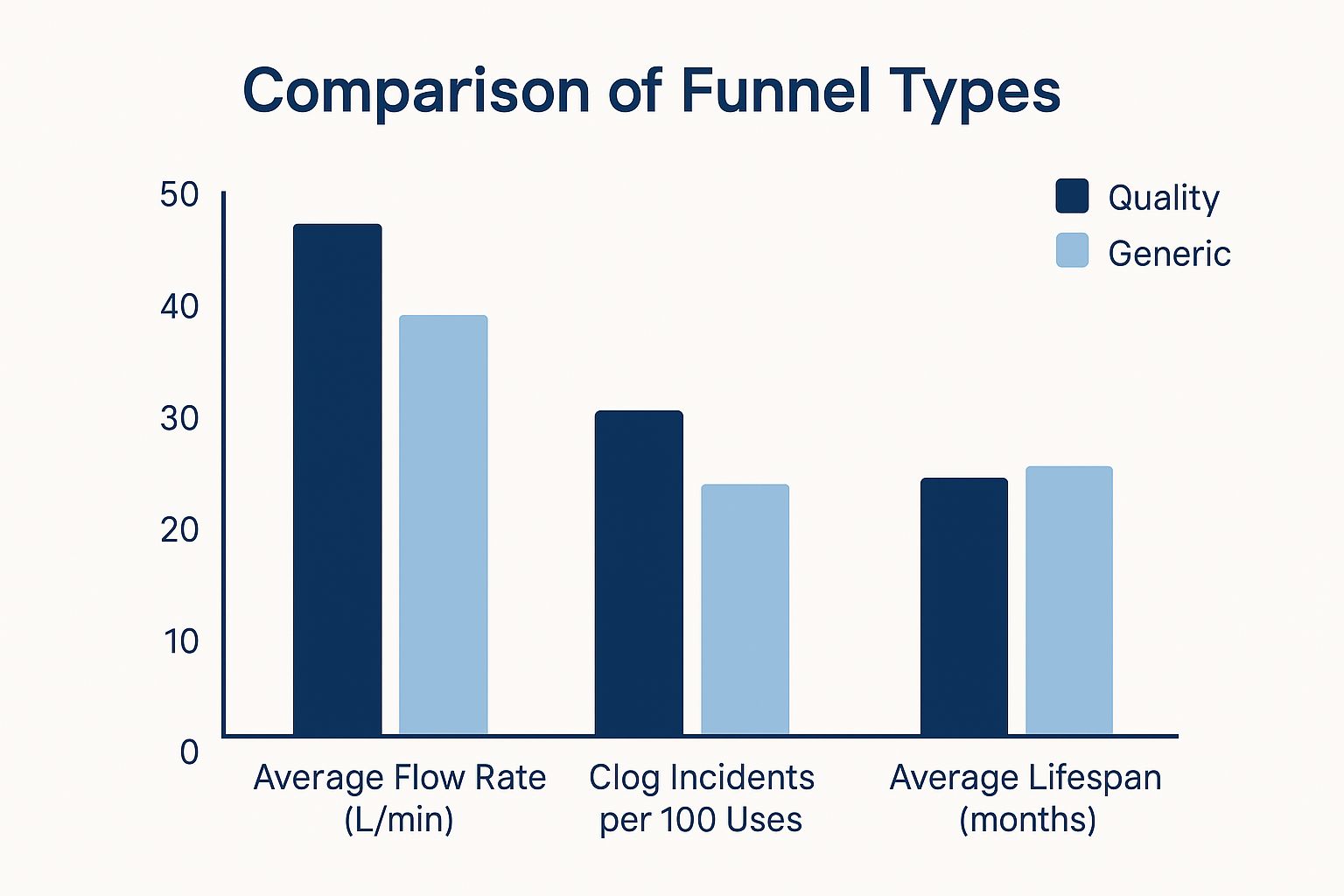
The chart above illustrates the difference between quality and generic fuel filter funnels. It compares key aspects like flow rate, clog incidents, and lifespan. It clearly shows that investing in a quality fuel filter funnel offers significant advantages.
Quality funnels provide superior flow rates, leading to faster refueling. They also experience fewer clogs, reducing frustrating interruptions. And finally, they offer a longer lifespan, providing more value for your money.
Choosing the right fuel filter funnel is a crucial decision for maintaining your engine's health. It's important to consider the different types of funnels available and their specific benefits. Just like choosing the right boat for a specific activity, selecting the right funnel will ensure optimal performance.
Disposable Vs. Reusable Fuel Filter Funnels
One of the first decisions you'll face is choosing between a disposable and a reusable fuel filter funnel. Disposable funnels are convenient for infrequent use. They offer a quick and easy way to filter fuel without the hassle of cleaning.
However, the cost of disposable funnels can add up over time. Reusable funnels, while requiring cleaning, offer significant long-term cost savings and are more environmentally friendly by reducing waste. A durable, reusable funnel can last for years with proper care. For example, a stainless steel funnel with a replaceable filter element can provide years of service.
You might be interested in: Read also: More about CLiX Fueling products.
Specialized Fuel Filter Funnels
Certain applications require specialized fuel filter funnels. For instance, diesel engines often benefit from funnels with water separation capabilities. This is important because diesel fuel is more prone to water contamination than gasoline.
Some funnels are also designed specifically for use with ethanol blends. These specialized funnels prevent the fuel degradation that can sometimes occur with standard funnels. The diverse automotive fuel filter market includes options like spin-on, inline, cartridge, nylon, in-tank, and universal filters. The market was valued at approximately $2.77 billion in 2024 and is projected to reach $5.09 billion by 2034, growing at a CAGR of 6.3%. Learn more about the automotive fuel filter market.
Design Features and Filtration Ratings
Beyond the basic types, consider the design features and filtration ratings. A stable base is essential to prevent tipping during refueling. An ergonomic handle provides a comfortable grip, especially when dealing with larger fuel containers.
Understanding filtration ratings, measured in microns, is also critical. This rating indicates the size of particles the funnel can filter out. A lower micron rating means finer filtration, providing better engine protection. For instance, a 10-micron filter will trap smaller particles than a 30-micron filter.
To help you choose the best fuel filter funnel, let's compare a few different types:
Comparison of Fuel Filter Funnel Types
This table compares different types of fuel filter funnels across key features and applications.
| Funnel Type | Filtration Rating (Microns) | Best For | Price Range | Reusable | Special Features |
|---|---|---|---|---|---|
| Basic Disposable | 30 | Occasional Use | $5 - $10 | No | - |
| Fine Disposable | 10 | Small Engines | $8 - $15 | No | - |
| Reusable Mesh | 20 | General Purpose | $15 - $25 | Yes | Easy to clean |
| Water Separating | 10 | Diesel Engines | $25 - $40 | Yes | Water trap |
| Ethanol Compatible | 5 | Ethanol Blended Fuels | $20 - $35 | Yes | Prevents ethanol degradation |
As you can see, the different funnel types cater to various needs and budgets. Choosing the right one depends on your specific application and how often you refuel.
Choosing the right fuel filter funnel ensures clean fuel, protecting your engine and saving you money on repairs in the long run.
The Hidden Damage Your Fuel Filter Funnel Prevents
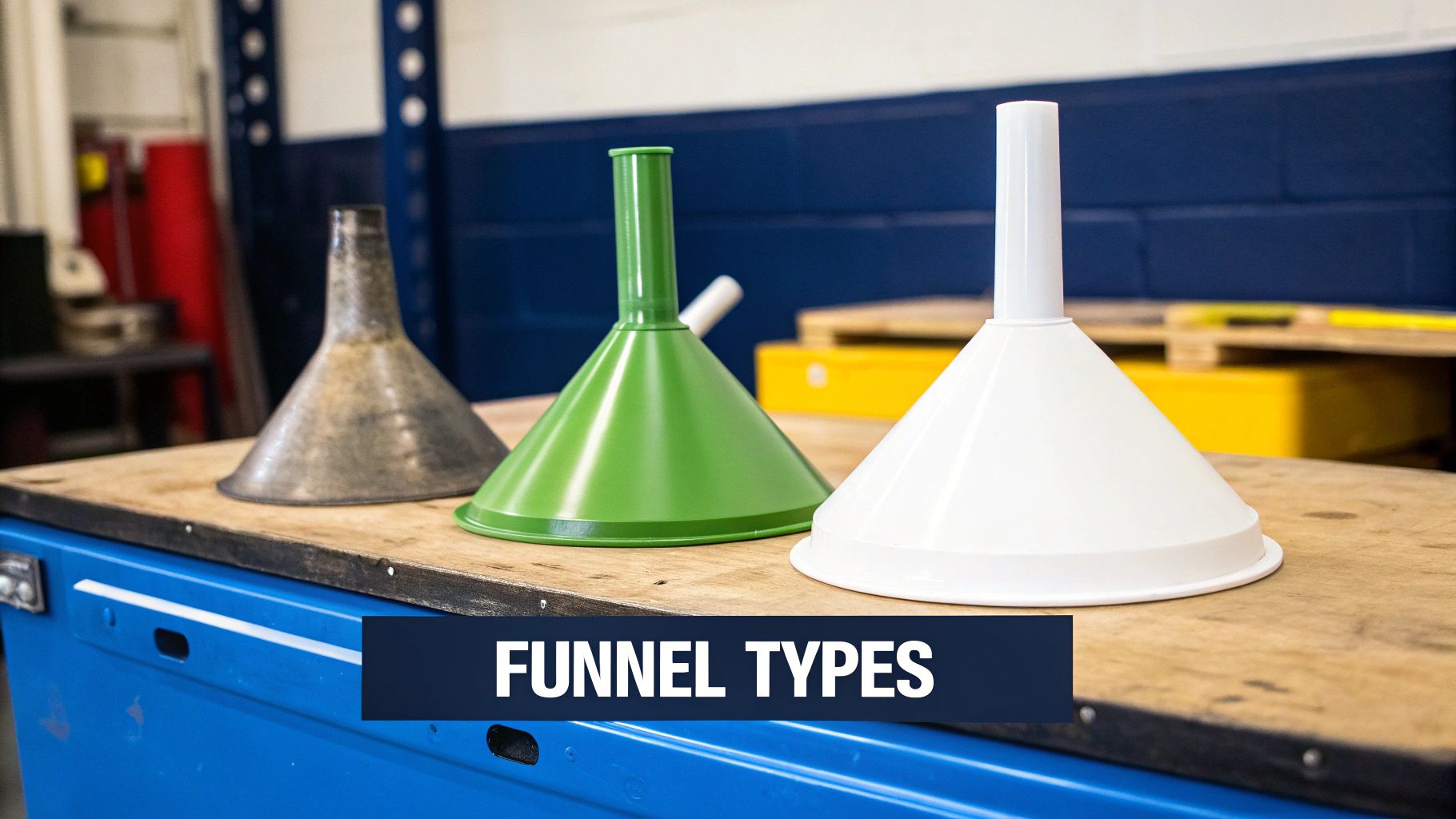
A fuel filter funnel isn't just about keeping your fuel clean. It's also about preventing a chain reaction of problems that can damage your engine. Think of it as the first line of defense for your fuel system, stopping trouble before it starts. This proactive approach can save you thousands of dollars in repairs later.
The Domino Effect of Contamination
What are the consequences when contaminants get past your defenses and into the fuel system? The damage might not be immediately obvious, but it adds up over time. Tiny particles, often too small to see, can clog your fuel injectors. This blockage disrupts the precise fuel spray needed for efficient combustion.
A clogged injector can lead to a lean fuel mixture, causing misfires and reduced engine power. Water in the fuel can also corrode fuel pumps and lines, eventually causing leaks and even fuel pump failure. Think of it like rust slowly eating away at your fuel lines from the inside.
Larger debris, such as rust flakes or dirt, can cause serious problems in your combustion chambers. These particles can score cylinder walls and damage piston rings. This reduces compression and engine efficiency, much like throwing sand into a precision machine.
Real-World Consequences: Case Studies and Examples
The contrast between engines regularly protected by quality fuel filter funnels and those without is striking. Repair shops see significant differences in the lifespan and performance of these engines. Mechanics frequently find badly clogged fuel injectors in vehicles that haven't used fuel filter funnels, leading to costly replacements.
Consider the case of a boat owner who regularly refueled without a filter funnel. Over time, water contamination caused major corrosion in the fuel tank and fuel lines. The necessary repairs were extensive and expensive. This underscores the importance of guarding against even seemingly minor contamination.
The global demand for fuel filters reflects this growing awareness. The fuel filter market was valued at $132.29 million in 2024 and is projected to reach $176.44 million. Explore this topic further for more detailed statistics.
Identifying the Warning Signs
Several warning signs can alert you to fuel contamination issues before a major breakdown occurs.
- Rough idling
- Hesitation on acceleration
- Decreased fuel economy
- Increased emissions
If you notice these early symptoms, you can address the problem before it becomes a major repair. Different fuel filter funnel designs are better at catching different contaminants. Learn more in our article about our blog sitemap. Choosing the right funnel is essential. For example, diesel engines are particularly sensitive to water, so a funnel with a water separator is crucial.
Using a fuel filter funnel is about more than just filtering fuel. It's about proactive prevention. You're taking steps to protect your engine and ensure its long-term health. This simple precaution can significantly extend the life of your engine and save you from expensive repairs.
Mastering Your Fuel Filter Funnel: Expert Techniques
Using a fuel filter funnel seems pretty straightforward, right? Well, getting the technique down, especially in less-than-ideal conditions, actually takes a bit more know-how. This section explores some expert techniques the pros use to get the best fuel filtration and minimize any potential problems. These strategies help ensure clean fuel delivery while preventing spills and other hazards.
Preparation: The Professional's Secret Weapon
It's easy to skip the preparation stage, but it’s really important for effective fuel filtration. Before you even think about touching the fuel, give your fuel filter funnel a good once-over. Look for any cracks, tears in the mesh, or a loose seal where the filter meets the funnel body. Even a tiny defect can mess up the whole process.
Next, make sure the fuel tank you're filling is clean and properly vented. This prevents pressure from building up and allows for smooth, even fuel flow. It’s like making sure the drain is clear before filling a sink. Also, choose a stable, level spot to do your refueling. This reduces the risk of tipping, especially when you're dealing with heavy fuel containers.
Positioning for Optimal Flow and Filtration
Getting the fuel filter funnel positioned correctly is key for efficient fueling and effective filtration. The funnel should sit firmly in the tank opening to create a tight seal. This prevents air locks, which can disrupt fuel flow and let contaminants in.
Think about pouring water through a funnel with a little air gap at the bottom. The water wouldn't flow smoothly. The same thing happens with fuel – air gaps can interrupt the process and affect filtration. Maintaining a steady, even pour helps your fuel filter funnel work its best. This allows the filter to trap contaminants effectively without getting overloaded.
Troubleshooting Common Fuel Filter Funnel Challenges
Even if you're doing everything right, you might run into some issues. If the fuel flow slows down or stops, the filter might be clogged. Try gently tapping the side of the funnel to dislodge any debris. But if the flow stays slow, it probably means the filter is saturated.
Different fuels and situations require specific approaches. To help you out, here's a handy guide:
To help illustrate this further, let's take a look at the following table:
Fuel Filter Funnel Usage Guidelines by Application
This table outlines the specific considerations when using fuel filter funnels across different scenarios and vehicle types.
| Application | Recommended Filter Type | Special Considerations | Safety Precautions |
|---|---|---|---|
| Automotive | Fine Mesh Reusable | Ethanol compatibility for blended fuels | Grounding strap to prevent static discharge |
| Marine | Water Separating | High resistance to corrosion from saltwater | Secure funnel to prevent movement in rough seas |
| Small Engines | Fine Disposable | Lower flow rates acceptable | Avoid overfilling small tanks |
| Motorsports | Ultra-Fine Reusable | Maximum filtration for peak performance | Specialized quick-disconnect fittings |
As you can see, the appropriate filter and safety precautions change depending on the application. For example, ethanol blends can degrade certain filter materials, so you’ll need an ethanol-compatible funnel. Diesel fuel is prone to water contamination, making a water-separating fuel filter funnel a must-have for diesel engines.
If the clogging issue persists, it's best to replace the filter or just use a new disposable funnel.
Mastering these techniques ensures you're getting the most out of your fuel filter funnel. This protects your engine, maximizes performance, and ultimately, keeps things running smoothly.
Extending Your Fuel Filter Funnel’s Lifespan
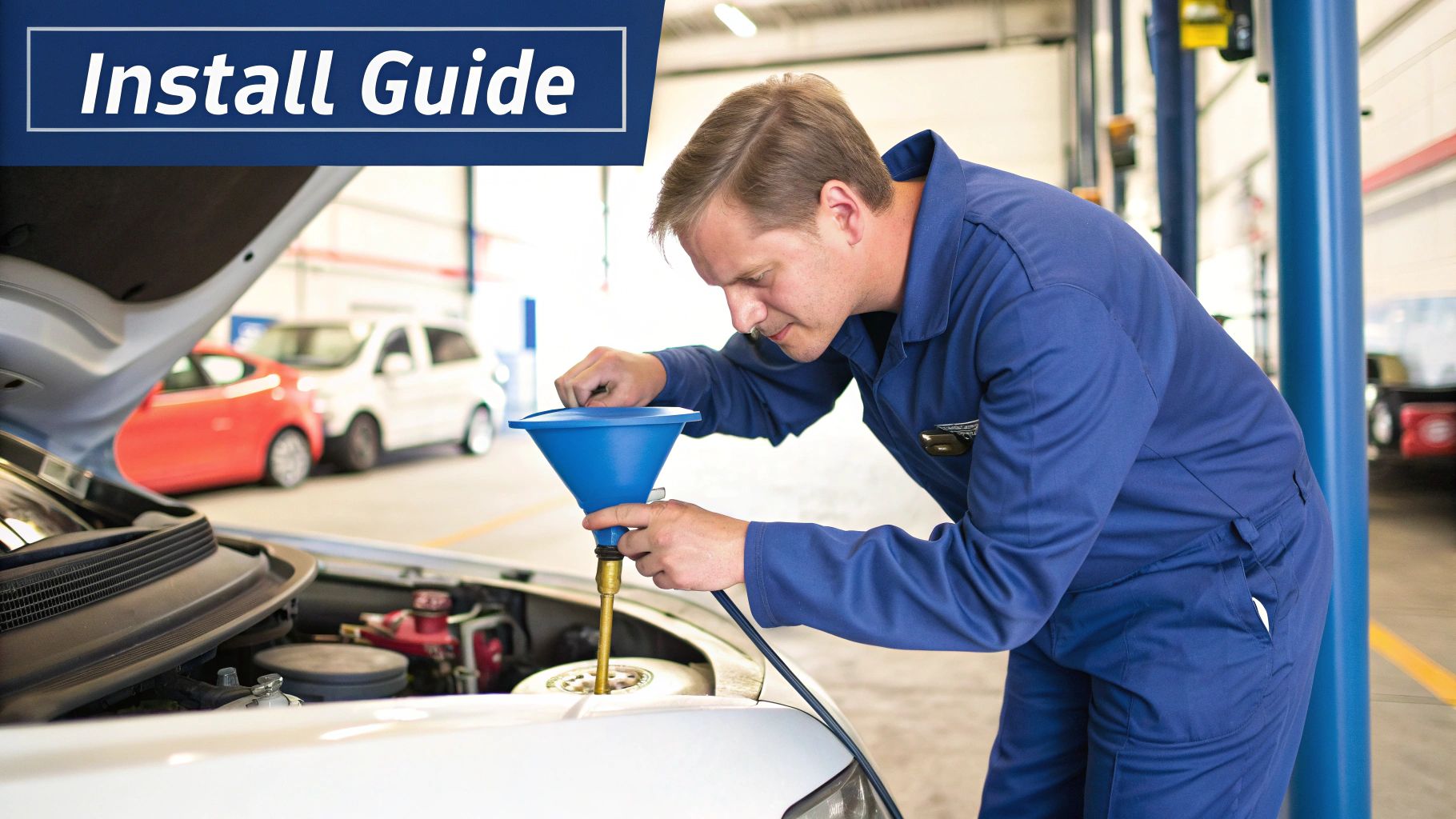
A quality fuel filter funnel is a smart investment. Proper care can significantly extend its life and ensure it continues protecting your engine. This section covers proven techniques for maximizing your fuel filter funnel’s effectiveness and longevity, gleaned from experienced users and maintenance experts. You might be interested in more information on CLiX Fueling.
Cleaning Methods That Preserve Filtration Integrity
Proper cleaning is crucial for reusable fuel filter funnels. However, some common cleaning methods can damage the filter media. Avoid using harsh brushes or abrasive cleaners. These can tear the filter material and reduce its effectiveness.
Instead, use a gentle stream of clean solvent to flush out trapped debris. Compressed air can also be effective for basic particle removal. This helps dislodge particles without damaging the filter.
Allowing the funnel to air dry completely before storage prevents mold and mildew growth. This keeps the funnel clean and ready for its next use.
Choosing The Right Solvent For Different Contaminants
Different contaminants require different cleaning approaches. For basic dirt and debris, a simple rinse with gasoline or diesel fuel (matching your typical fuel type) often works.
However, for stubborn fuel residues, a dedicated fuel system cleaner might be necessary. Be cautious when using stronger solvents, as they can damage certain filter materials.
Always check the manufacturer’s recommendations for compatible cleaning solutions. This ensures effective cleaning without compromising the filter's integrity.
Recognizing The Need For Replacement
Even with regular cleaning, fuel filter funnels eventually wear out. Recognizing the signs of a failing filter, even when it looks clean, is crucial. A consistently slow flow rate, even after cleaning, indicates the filter media is clogged beyond repair.
If you notice fuel bypassing the filter, it's a clear sign of damage and requires replacement. Don’t wait for engine problems to replace your filter. A timely replacement prevents costly repairs.
Proper Storage For Maximum Lifespan
Proper storage is just as important as proper cleaning. Storing a fuel filter funnel improperly can compromise its effectiveness. Always store the funnel in a clean, dry environment, away from direct sunlight and extreme temperatures.
For example, storing a funnel in a damp shed can lead to mold growth, clogging the filter. Direct sunlight can make plastic components brittle and prone to cracking. These conditions can degrade the filter material and reduce its lifespan. These simple storage precautions can significantly extend the life of your fuel filter funnel.
Revitalizing And Testing Your Fuel Filter
Sometimes, a seemingly clogged filter can be salvaged. Soaking the filter in a compatible solvent overnight can sometimes loosen stubborn deposits. However, this is a last resort, and replacement is often the best option.
After cleaning or attempting to revitalize a filter, test its effectiveness. A simple water test can verify its performance. If water passes through easily, it's time for a new filter. This ensures you're getting the necessary protection. By following these tips, you can extend the lifespan of your fuel filter funnel and keep your engine running smoothly.
Beyond Automotive: Fuel Filter Funnels in Specialized Use
Fuel filter funnels are essential tools not only for cars and trucks but also for various specialized fields. Their ability to remove contaminants makes them critical for maintaining engines and equipment, from the ocean to the sky.
Marine Applications: Battling Water Contamination
Water is a constant challenge in marine environments. Humidity and condensation can cause water to build up in fuel tanks, which is a serious threat to marine engines. Specialized fuel filter funnels are crucial for protecting these engines.
These funnels act like a life preserver, keeping engines running smoothly. They use fine mesh screens and sometimes hydrophobic materials to repel water while letting fuel pass through. This provides exceptional water separation capabilities, crucial in the marine world.
Aviation: Upholding Stringent Fuel Purity
Aircraft engines require even purer fuel than cars. Even tiny particles can have devastating effects in these demanding environments. This means aviation fuel requires incredibly strict filtration, far exceeding normal automotive needs.
Specialized fuel filter funnels are used to ensure absolute purity. They trap even the smallest contaminants, making flight safer and more efficient.
Power Equipment: Protecting Vulnerable Small Engines
Small engines in equipment like lawnmowers and chainsaws are very sensitive to fuel contamination. Their small fuel systems and delicate parts can be damaged by even tiny bits of debris. A speck of dirt can clog a carburetor jet, making the engine sputter or stall.
Fuel filter funnels offer necessary protection, ensuring these small but important engines stay reliable and last longer. For tips on maintaining your equipment, check out some general Car Maintenance Tips.
Motorsports: Gaining a Competitive Edge
In the fast-paced world of motorsports, fractions of a second matter. Specialized fuel filter funnels are key for optimal engine performance and reliability, giving teams an edge.
These funnels often use ultra-fine filtration to remove the tiniest particles. This improves fuel flow and engine efficiency, potentially making the difference between winning and losing.
From Emergency Generators to Vintage Machinery: Tailoring Filtration to Specific Needs
Fuel filter funnels are used in many other situations beyond cars. Emergency generators, vital in crises, benefit from the reliable performance that clean fuel offers. Owners of vintage machinery also use these tools to safeguard their investments and keep older engines working. Choosing the right funnel is essential, even in these diverse cases.
Selection Criteria and Specifications
The right fuel filter funnel depends on the specific application. Micron rating, material compatibility, and flow rate are all-important factors. A marine application requires a funnel with excellent water separation, while a vintage car might need one compatible with older types of fuel. Understanding these specific needs ensures the best performance and protection.
Professionals across many fields depend on quality fuel filter funnels to keep their equipment in top shape. These tools play a vital, behind-the-scenes role in countless operations, from aircraft to emergency power systems. Their use prevents costly repairs and extends the life of valuable equipment.
Looking for a cleaner, easier way to fuel your boat? Check out CLiX Fueling Solutions at https://clixfueling.com for spill-free fueling with an innovative automatic shut-off system. Protect your boat, the environment, and your peace of mind.

